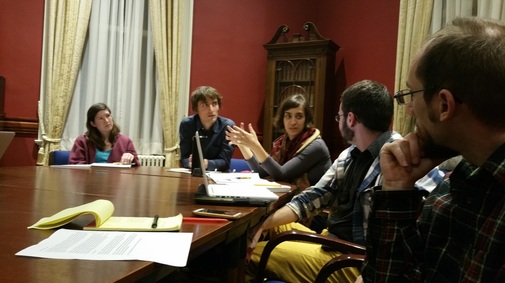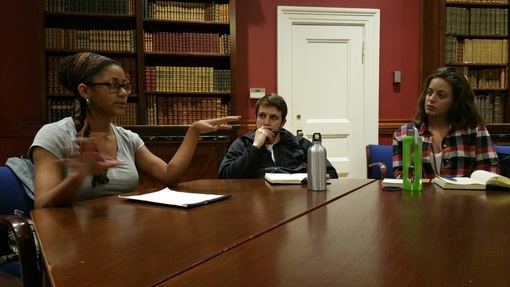|
In William Deresiewicz's provocatively titled essay in The Atlantic, the author traces the origins of the word "artist" back to etymological roots that are closely tied to the concept of the artisan: a worker in a skilled trade (otherwise known as a craftsman). Oh, how things have changed since then...
Of particular note, as artists have become more and more professionalized and credentialed in our most recent history, a significant disruption to our ecosystem has been the worrisome fate of the (largest) institutions that have long provided a buffer between artists and market forces. "The institutions that have undergirded the existing system are contracting or disintegrating. Professors are becoming adjuncts. Employees are becoming independent contractors (or unpaid interns). Everyone is in a budget squeeze: downsizing, outsourcing, merging, or collapsing. Now we're all supposed to be our own boss, our own business: our own agent, our own label; our own marketing, production, and accounting departments. Entrepreneurialism is being sold to us as an opportunity. It is by an large, a necessity. Everybody understands by now that nobody can count on a job." "Still, it [entrepreneurialism] also is an opportunity...." It is through this framing--that designing your own future really is an opportunity--that we approach the challenge of pursuing community-based artistry in 2015. One of the most significant challenges is to attempt to manage the delicate balancing of our current necessities (e.g. paying the rent) with the time and dedication needed to pursue our mission-driven future plans (e.g. a community-based residency). On a practical level, every time the phone rings and there is an opportunity to engage with the outside world, it might be best evaluated through the following checklist: 1. How much does it pay (after expenses)? 2. How much time and energy will it require (including preparation and travel), taking me away from focusing on my own projects and goals? 3. Does this opportunity come with any flexibility (so that I can be sure to meet my own needs first--or, at least, not last)? 4. Will I derive enough artistic satisfaction? (Oh, how I wish this could be the first criterion on this list!) 5. What is the potential for creating and/or building relationships that may yield benefits in the future? 6. How does this opportunity position me better for what I want to achieve in the future? (How does it help me address my long-term strategy?) I'm really interested in exploring the ways that #5 and #6 can be part of the equation. For instance, can you imagine a scenario in which you would agree to perform at your neighborhood block party for no money? Can you imagine re-arranging your private teaching studio schedule in order to make a special trip to work with a handful of students at a new community center with a potentially robust arts audience? In what circumstances would would you decide to choose a part-time job that allows you to work from home on your own schedule but has nothing at all to do with your art? Read Mr. Deresiewicz's entire essay for the author's take on the evolution of our understanding of artists in society--including their training, their practice, and the shape of their careers--and the "new questions, open questions, questions that no one is equipped as yet to answer" in 2015.
0 Comments
"Through this series, I want to grow a community of people who recognize and respond to the power of live chamber music. I believe that our enthusiasm coupled with serious artistic exploration, the dialogue of ideas presented through our programming, and the intimacy and informality of these concerts, make the series uniquely able to communicate the personal relevance of music..."
"In regards to our emphasis on creative collaboration, we believe that an opportunity for students of any age to work toward a common artistic purpose, through listening and responding to each other, will have broad, positive social impact. In addition, we see this as an opportunity for the two of us to work together and to combine our creative, performing and teaching lives in a way that is born out of our artistic values, and connects with a non-specialized audience…" "I’d like to start a collective organization with other interested jazz musicians that will put on performance series, bring music to new venues/audiences, and develop strategies to promote music and make community more visible…" "The goal is to have a place where someone can be creative and part of a creative community that is open, non judgmental and encouraging. Right now, it seems that the special needs community is a good fit but I don’t want to limit the scope. I want the bricklayer and the banker to be part of this community as well…" "The School is open to everyone, at any age, to learn an instrument, or a rhythm, or a dance routine, or otherwise help us make music together. We value diversity, inclusion, egalitarianism and mutual love and respect, and we have mentors and players with all levels of experience, eager to help others learn to play too…" "My goal for a community-based residency would be to see music become a full community event, something that draws in people of all ages to experience music and life together, to learn from and with each other. My desire would be to offer affordable or free music education—private and group lessons, ensembles, casual and academic classes, observations, music therapy—that would regularly bring people of all ages and skill levels together. Teenagers and adults grouped in ensembles; children and elderly paired as conversation and practice partners; people of all ages writing and sharing program notes at chamber music concerts…" "I would love to create a program that is a community arts hub. I am thinking realistically about where I want to settle, the kind of community I gravitate toward, and where I would want to raise a family. I can picture myself in a small, rural community…" "I want to bring classical music, and music making in general into a community that might not traditionally have access to it. I also would like to bring a new perspective to the classical music world and broaden the education standards of the classical tradition. I see children knowing many different styles of music, as well as improvisation and composition in their training…" "I propose starting a school-based program of vocal music for middle-and-high school-aged students. These youth choirs will rehearse regularly after school and be open to all students without an audition. Instead of classical choral repertoire, this program will focus on folk and world music, taught by teachers with deep expertise and direct experience of these traditions…" |
AboutSharing student project documentation and, more recently, my own. Archives
June 2022
Categories |


 RSS Feed
RSS Feed
